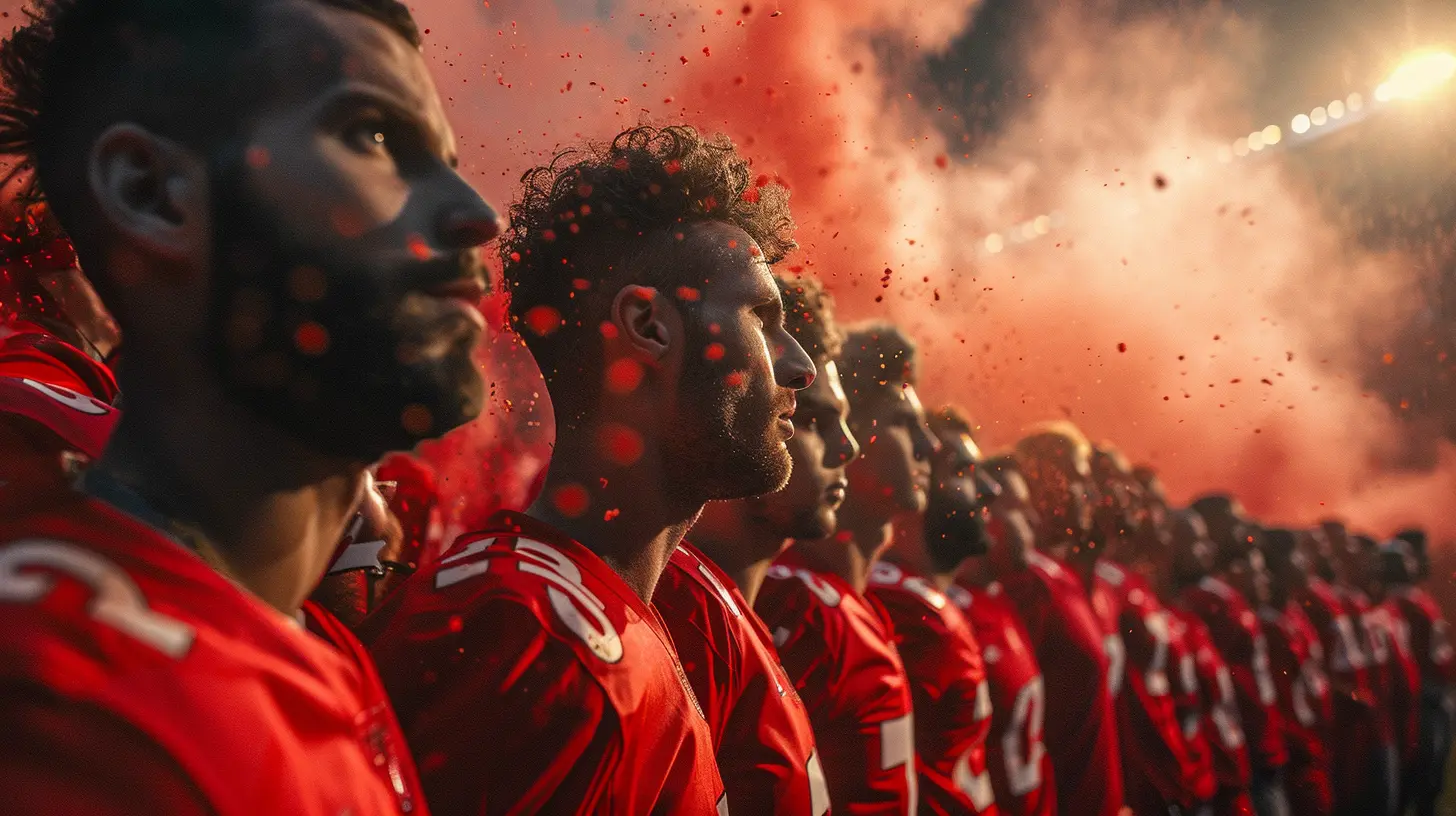Managing Team Expectations: From Athletes to Fans
21 July 2025
Let’s talk about expectations — not the kind your grandma had when she gave you her famous chocolate chip cookie recipe and hoped you’d nail it. (Spoiler alert: you probably didn’t.) We’re talking team sports expectations. Whether you’re on the field, behind the scenes, or screaming at your TV in a jersey that smells like last season, expectations are everywhere.
From the pressure players put on themselves, to the lofty dreams of fans, to the behind-the-scenes tension in locker rooms and boardrooms — managing these expectations is a balancing act. No, seriously, imagine juggling flaming swords while riding a unicycle… blindfolded. That’s kinda what it's like.
So, buckle up. Let’s dive into how coaches, players, and even us fans can keep expectations in check without losing our competitive spirit (or our sanity).
Setting the Stage: What Are Team Expectations, Anyway?
Before we get all deep and philosophical, let’s make sure we’re on the same page. Team expectations can come from:- Coaches wanting improved performance or a title-winning season
- Players chasing personal bests or fighting for roster spots
- Fans dreaming of championship parades and post-game bragging rights
- Media hyping every training camp like it's the Super Bowl
It’s a thick soup of hopes, goals, pressure, and a pinch of delusion. And if not handled right, it boils over.
Athletes: Pressure Cookers in Cleats
Let’s start with the folks actually doing the work — the athletes. These people wake up early, train hard, eat like monks (well, most of the time), and are expected to perform like machines. Sounds exhausting, right?The Double-Edged Sword of Self-Expectations
Most players are their own harshest critics. That miss? That turnover? That extra donut at breakfast? They remember it all.But while ambition fuels greatness, it can also burn out the best. When expectations become unrealistic — like thinking you have to score every game or break records every season — performance actually dips. Why? Because stress messes with the brain. It turns smooth passes into fumbles and swishes into airballs.
Pro Tip:
Coaches and mentors should help athletes set SMART goals (Specific, Measurable, Achievable, Relevant, Time-bound). Instead of “Be the best,” how about “Increase assists by 15% this season”? Manageable goals = steady progress.
Coaches and Staff: The Real MVPs of Expectation Control
Coaches aren’t just clipboard-holding, whistle-blowing sideline statues. They’re the emotion managers, the expectation wranglers, and sometimes, the therapists.Juggling Goals Without Dropping the Ball
The coach’s challenge? Balancing team performance goals with individual development — and somehow still keeping morale high even when the scoreboard doesn't cooperate.They have to:
- Inspire players without overwhelming them
- Keep things real without killing the dream
- Deal with fans and media… who are not always, let’s be honest, reasonable
It’s like being a parent to 25 competitive kids, each with different moods and needs. (And yes, even professionals have moods.)
Communication is the Secret Sauce
Want to keep your locker room vibe strong? Communicate. Be transparent about roles, team goals, and expectations from day one.And remember: feedback should be constructive, not crushing. No one ever got motivated by “You’re trash.” But “You’ve got the talent; here’s how we polish it” hits different.
The Fans: Passionate, Loyal... and Slightly Unhinged
Let’s not forget the heartbeat of any sports franchise: the fans. Man, fans are wild. One week it’s “We’re unbeatable!” and the next it’s “Burn the jerseys, trade everyone!”The Cheerleaders and the Critics
Fans live and breathe their teams. That’s beautiful — until expectations spiral into toxic territory. That rookie quarterback struggling in his first season? Some fans are already calling for his head on social media. Yikes.Managing Fan Expectations: Not a Lost Cause
Here’s the hard truth: You can’t control fandom completely. But you can guide it.Teams and media staff can:
- Share real, behind-the-scenes stories showing player growth and effort
- Use content (like blog posts, vlogs, interviews) to humanize the journey, not just celebrate the results
- Be honest in PR — a rebuilding year is NOT a championship year, and that’s okay
When fans understand the process, they become more patient. And patience leads to support. And support? That turns slumps into comebacks.
Bridging the Gap: Aligning Hype with Reality
You’ve got athletes with dreams, coaches with plans, media with narratives, and fans with opinions. How do we make sure all these expectations are rowing the boat in the same direction?Answer: Clarity and Culture
Team Culture is Everything
What’s your team’s identity? Underdogs? Powerhouses? Rebuilders? Veterans?Own it, express it, and build a culture around it. When everyone — from benchwarmers to superfans — buys into the same mission, it gets easier to manage the rollercoaster of the season.
Keep the Narrative Honest
We love a good sports story — rags to riches, last-minute goals, comeback kings. But setting expectations based only on hype is dangerous.Stay grounded. Celebrate effort, progress, and resilience — not just trophies.
When Expectations Hurt: Mental Health in Sports
Let’s talk real talk. Unrealistic expectations can crush a person, even if they’re a six-foot-seven basketball star or an Olympic gymnast.The Weight of the World (Or Just the Stadium)
Mental health struggles in sports are real, and they’re finally getting the attention they deserve. Athletes aren’t robots. They deal with anxiety, depression, burnout — often made worse by fan expectations, media pressure, and even internal guilt.Supporting the Human Behind the Jersey
Organizations must:- Offer mental health resources
- Normalize talking about struggles
- Encourage time off for recovery — mental or physical
Because guess what? A happy, balanced athlete plays better. Simple math.
The Media’s Role: Stirring the Pot or Calming the Storm?
Oh boy, sports media. The ultimate double-edged sword.Hype Machines & Hot Takes
Sometimes, media blows things way out of proportion. A couple of great games? Suddenly, a rookie is the next Michael Jordan. A bad loss? The sky is falling.Sure, it drives clicks and engagement, but it also sets unrealistic expectations that athletes and teams have to carry like a backpack full of bricks.
A Shift Toward Authenticity
The good news? More media outlets now focus on storytelling — showing the full picture. The grind, the hustle, the heartbreak, the bounce-back.Fans are starting to appreciate this raw, real coverage. And that helps lower the pressure to be “perfect” all the time.
Managing Expectations in Losing Seasons
Let’s face it: not every year is a win. Some seasons hurt. Players underperform, injuries pile up, and the standings look… well, ugly.How to Keep Spirits High (And Twitter Calm)
- Be transparent: Acknowledge where things went wrong without blaming players or coaches outright- Highlight development: Praise young talent stepping up or veterans mentoring rookies
- Celebrate small wins: That lone win streak, or that breakout game — it's all part of the journey
Because remember, even Cinderella had to clean floors before the ball.
Wrapping It All Up: Keep It Real, Keep It Fun
Sports are emotional. That’s why we love them. The highs? Unmatched. The lows? Gut-wrenching. But at the end of the day, it's a game — and games are supposed to be fun.Managing expectations isn’t about lowering the bar. It’s about setting the bar in a way that challenges, inspires, and supports everyone involved — from the player lacing up their cleats, to the fan who paints their face every Sunday.
So let’s keep cheering, keep dreaming, and maybe throw a little grace into the mix when things don’t go as planned.
Because sometimes, managing expectations is the difference between a broken heart and a comeback story.
all images in this post were generated using AI tools
Category:
Team ManagementAuthor:

Everett Davis
Discussion
rate this article
1 comments
Azura Weber
In the delicate balance of managing expectations, both athletes and fans must acknowledge their interconnected roles. Athletes strive for excellence, while fans invest emotional capital. True success lies not solely in victories but in cultivating resilience, understanding, and a shared journey beyond the scoreboard.
August 9, 2025 at 11:01 AM

Everett Davis
Thank you for your insightful comment! It beautifully captures the essence of the athlete-fan relationship and the importance of resilience and mutual understanding in the pursuit of success.


